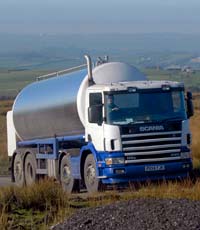Dairy sector struggles with icy blockade

The milk industry is struggling to recover from a week when dairy farmers were forced to pour milk away as wintry weather prevented tankers from reaching farms. Deliveries to shops in rural areas have also been affected, leaving many families short of milk.
Heavy snow and plummeting temperatures brought the country to a standstill, and dairy processors struggled to collect milk from isolated farms. “One of the big issues is a lack of grit and salt to clear rural roads,” said Sian Davies, dairy advisor at the NFU. “We assumed that local authorities would have prepared for the winter, but some stocks are still empty. Milk is in short supply in small rural shops because of the difficulty of delivering to them.”
Peter Nicholson, milk procurement director at Wiseman Dairies, said milk collections were running slowly, but tanker drivers and farmers were coping well. “But deliveries are a more complex issue – certainly there are some difficulties with accessing stores.”
Farmers in Yorkshire, Derbyshire and Northumberland had been worst affected, said Paul Flanagan, spokesman for First Milk. “We have had issues accessing individual farms, where we’ve been unable to pick up the milk.” However, contingency plans developed after similar weather at the start of the year meant fewer farmers were having to dispose of milk, he added. Farmers were meeting their responsibilities to keep their roads and tracks clear, with good communication enabling strategic planning with local collection hubs. “We’ve gone back to collect milk the next day – overall the hauliers and farmers have done particularly well. It’s a real team effort.”
Arla suppliers had also suffered, with temperatures hitting -17° in Yorkshire, said Jonathan Ovens of the Arla Foods Milk Partnership. “A handful of farmers have had to dump milk – others have just missed a collection. The local depots are liaising with the farmers – everyone is working together.” Demand for milk had soared due to panic buying and increase in consumption of hot drinks, he added.
Producers in the South West had been less badly affected, said a spokesman for Milk Link. “We did have someone yesterday who had to dispose of their milk because the tanker couldn’t get in – but most farmers have been good at gritting and removing snow so that the lorries can get through.”
Tim Price of NFU Mutual said the claims office was busy taking calls from farmers who had been forced to discard their milk. “We estimate that about a quarter of farmers have insurance for uncollected milk, while others may have some arrangement with their dairy.”
Deliveries of feed had also been affected, and the NFU had requested a derogation from working hour regulations for feed and milk lorry drivers, said Miss Davies. It had also secured a derogation from agri-environment schemes, enabling farmers to feed livestock outside. “Routine work will take longer, because of the need to defrost pipes and clear yards.”
Farmers should check their milk contract to see how many milkings could be stored together, and whether milk could be stored in temporary containers, she added. With the cold weather likely to continue throughout the month, the disruption could continue to get worse.
